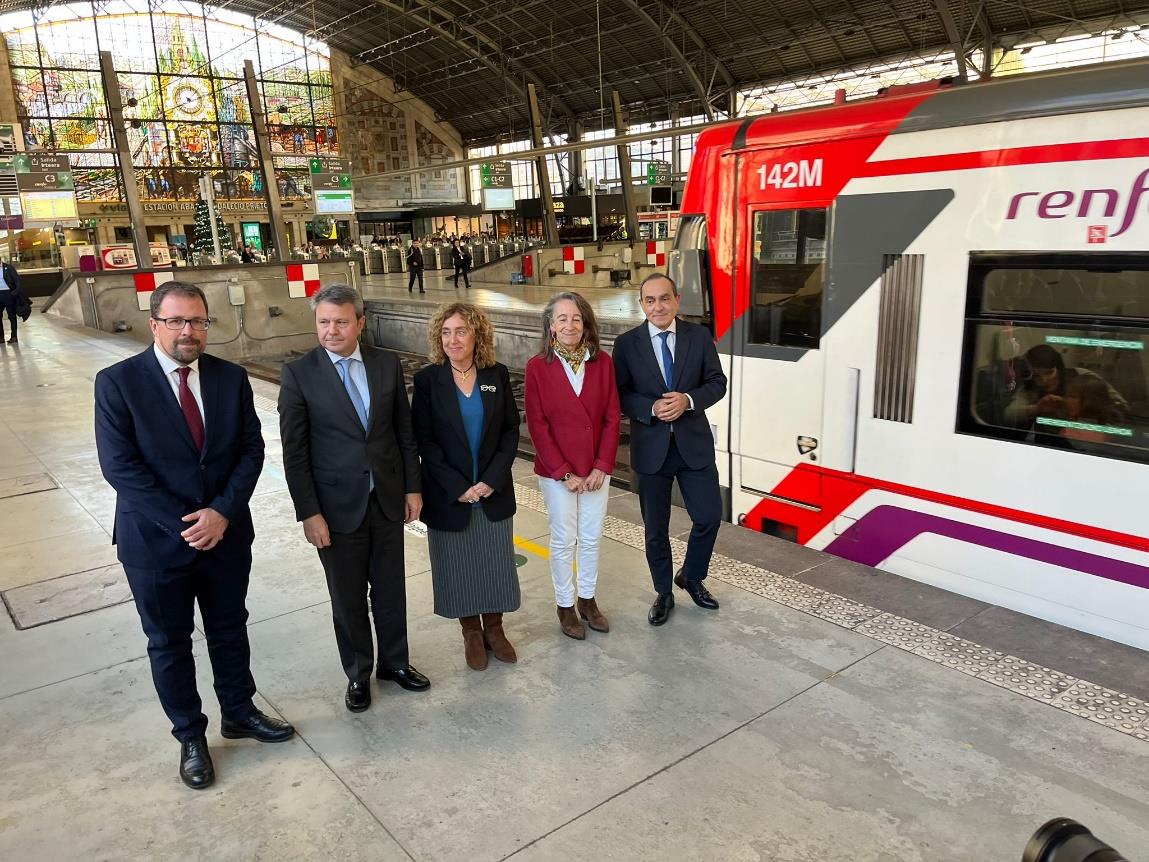
The Government of Spain, the Basque Government and Renfe signed an agreement to transfer the management of Basque Cercanías services to the regional government, entering into force on January 1, 2025.
“This is a necessary milestone. The assumption of Cercanías powers by the Basque Administration will mark a turning point in rail passenger transport services in the Basque Country” the Secretary of State for Transport, José Antonio Santano, said.
The signing ceremony was held on November 28, 2024 at the Abando-Indalecio Prieto station in Bilbao and was attended by the Secretary of State for Transport, the president of Renfe, Raül Blanco, and the Minister of Mobility, Susana García Chueca.
The transfer agreement includes a commitment by the Spanish State to invest more than EUR 400 million in railway infrastructure in the Basque Country. Of this amount, investments worth EUR 136 million are currently being carried out and are in the construction phase, under contract, in execution or completed. “This transfer is the result of the permanent collaboration between both administrations and the good harmony to achieve shared objectives and thus bring services closer to citizens,” José Antonio Santano said.
Around 100 activities, worth EUR 100 million, are planned to be implemented to address some of the shortcomings affecting the provision of suburban services and to improve the situation.
The signing of the agreement follows a successful negotiation from March in the Joint Commission on Transfers between the central and Basque governments. And it will also be a decision that must be passed by the Council of Ministers to modify the contract between the General State Administration and Renfe Viajeros for the provision of the service. An addendum to the contract that consists of the splitting of the Cercanías services provided in the Basque Country, a necessary element for this agreement to reach its full effectiveness and plenitude.
Transferring the services from the Spanish Government, the Basque Government’s Sustainable Mobility department assumes functions that were previously held by the General State Administration.
“A new stage has opened, we are not satisfied with the managing that we have, we want to go further, growing and improving, quantitatively and qualitatively,” Susana García Chueca, the Minister of Sustainable Mobility said.
For its part, the General State Administration’s responsibilities include regulation, the issuance of railway company licences, the functions assigned in matters of operational safety and interoperability on the Spain’s railway network, those relating to railway personnel, their training and the issuance of their enabling titles, the investigation of accidents and those relating to the rates to be applied to railway transport on the country’s railway network and the access pricing system to said network, among others.
Basque Cercanías services cover the commuter system of San Sebastián and Bilbao including three lines of the metropolitan area of Bilbao, the Irun-Brinkola line and the narrow gauge service in Bilbao. As a whole all the lines transported around 23 million passengers in the Basque Country throughout 2023.
The agreement covers the Bilbao Iberian gauge commuter train core comprising:
- C-1 Bilbao Abando – Barakaldo – Santurtzi;
- C-2 Bilbao Abando – Barakaldo – Muskiz; and
- C-3 Bilbao Abando – Laudio – Orduña.
- As well as Bilbao narrow gauge commuter C-4f line Bilbao – Balmaseda.
- The transfer also includes the Donostia – San Sebastián Iberian gauge commuter line C-1 Irun – San Sebastián – Tolosa – Brínkola.
In addition, new suburban services between Bilbao and Karrantza could be declared in Biscay, as well as between Araia-Gasteiz in Alava and Gasteiz-Manzanos Ribera Beitia. In Alava, the suburban services would be established on the current railway line, which would allow better connections in the Alava plain and the Añanako, benefiting mobility, territorial cohesion and economic development.
The management of the five transferred lines is very complex and the Basque Government is focusing on three priorities. The first one covers the improving accessibility for which a working group with will be established with Adif, to analyse and prioritise the related investments. Another priority is to strengthen the Alava service in response to transport demand with trains between Miranda de Ebro and Altsasu and between Karrantza and Arangu. Another focus is on the rolling stock renewal for which Renfe has committed to replace 25 of the 44 existing trains that operate the lines with new ones that offer better services in the next three years. At the same time, Adif will make improvements to the infrastructure including tracks, stations and other facilities which will continue to be the responsibility of the country’s State.
As for the new services, the train shuttle between Karrantza and Arangu will provide five services in both directions and will be launched when Adif completes the electrification works. In the case of Álava, the line will offer new services on weekdays and weekends, in the first hour of the morning, at noon and in the last hour of the evening, and several routes will be extended. The improvement has been agreed with Renfe, and they are waiting for the Ministry’s administrative formula, because it is a new service between Miranda de Ebro and Alsace, and therefore passes through three autonomous communities.
Share on:






